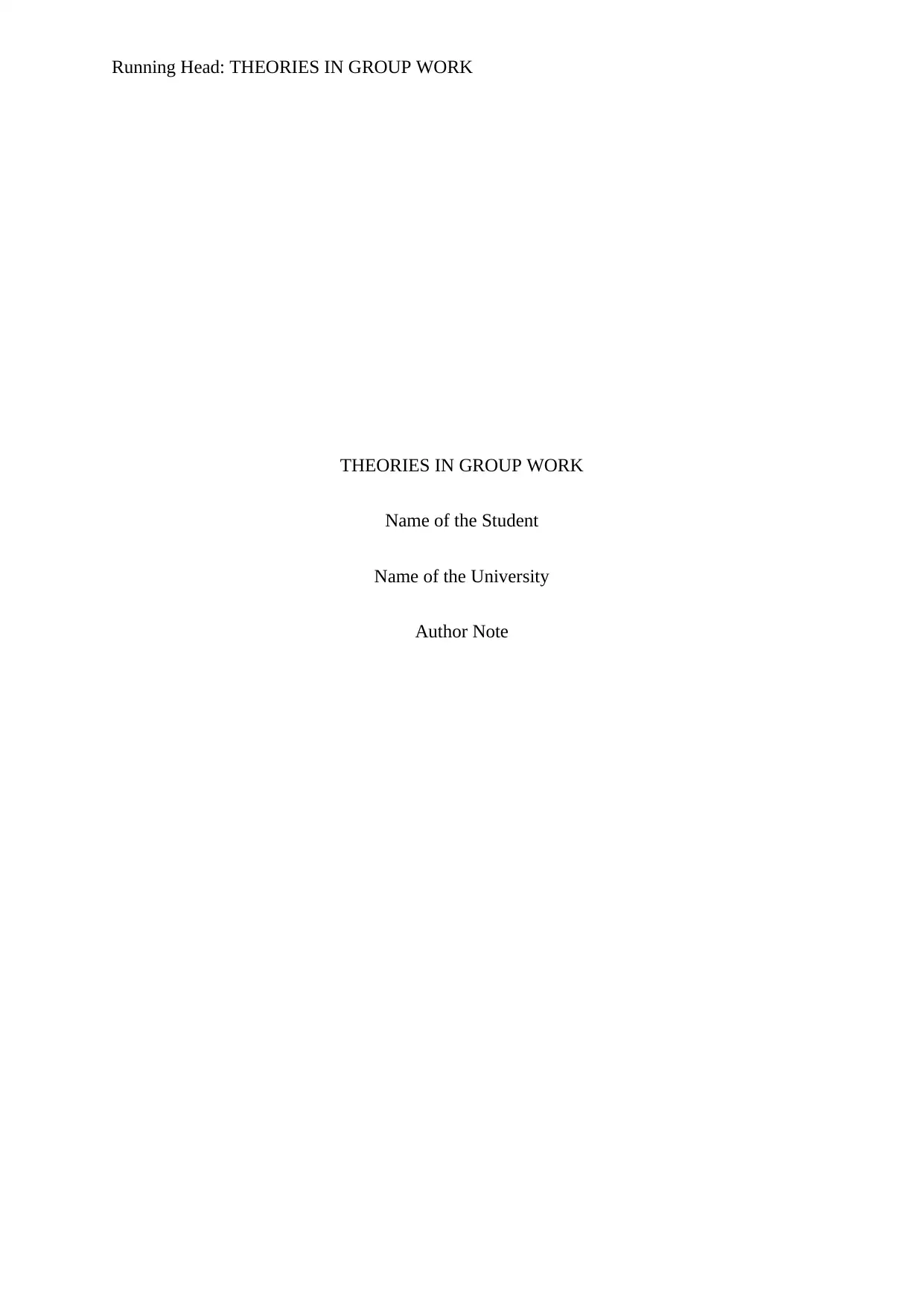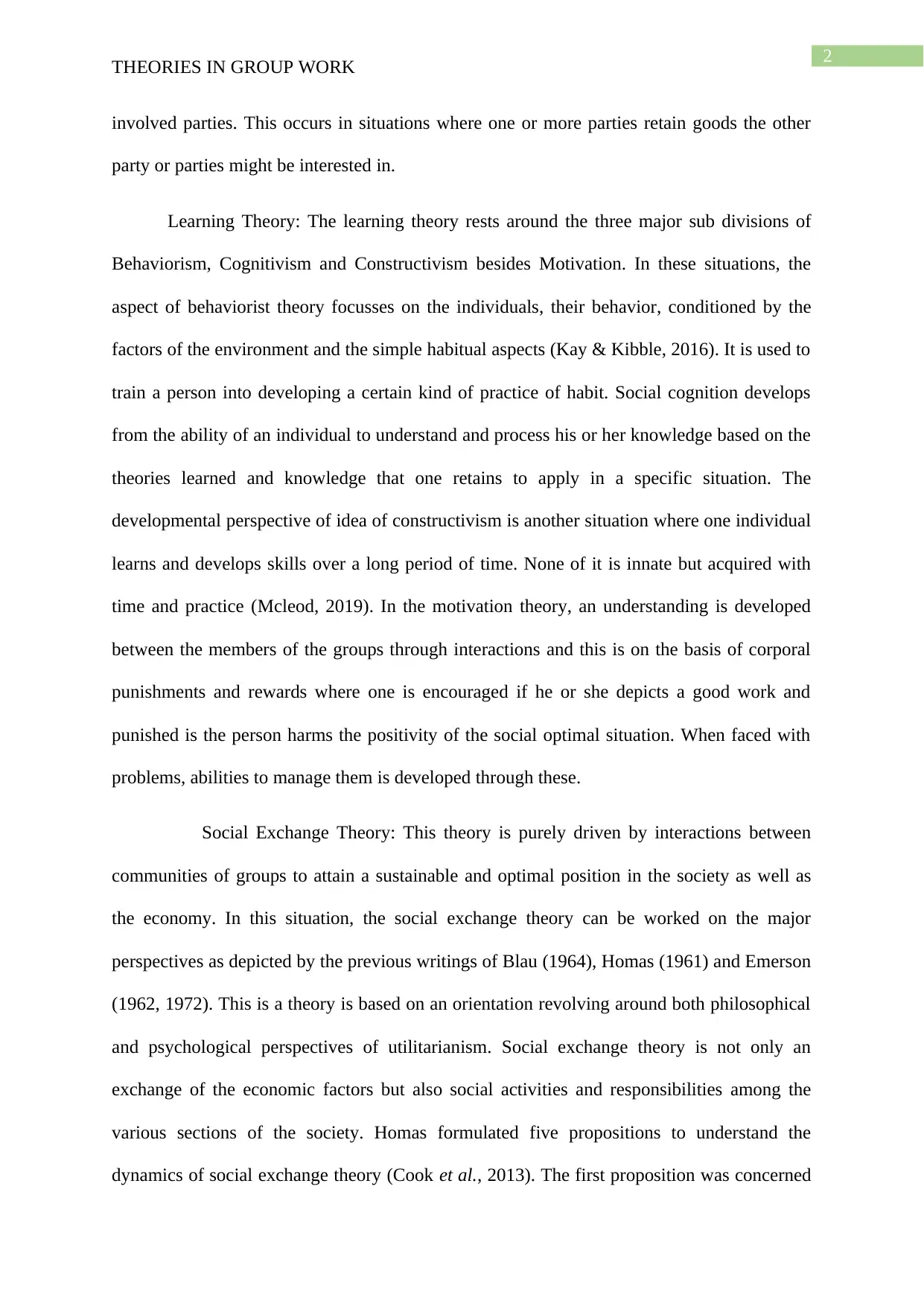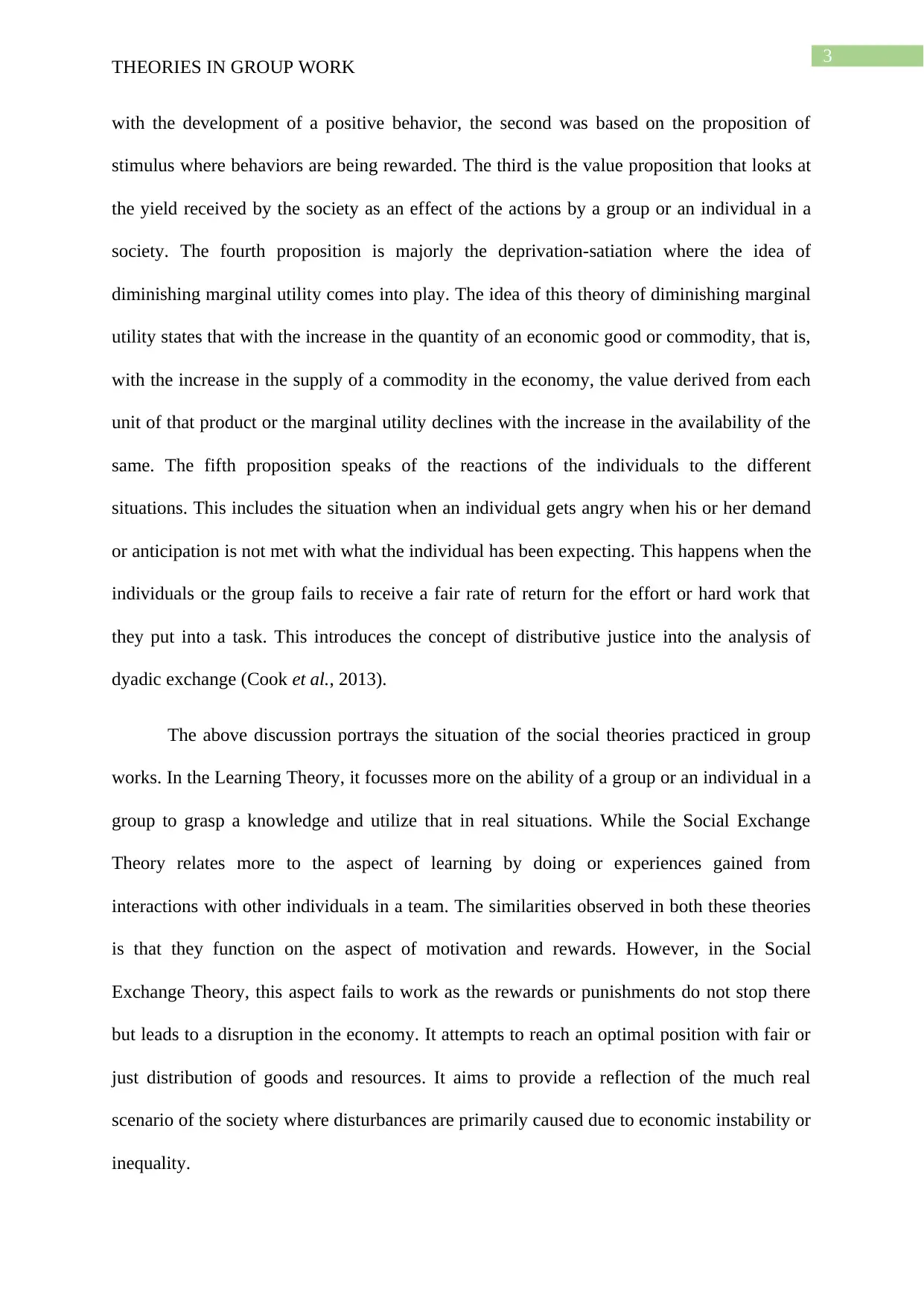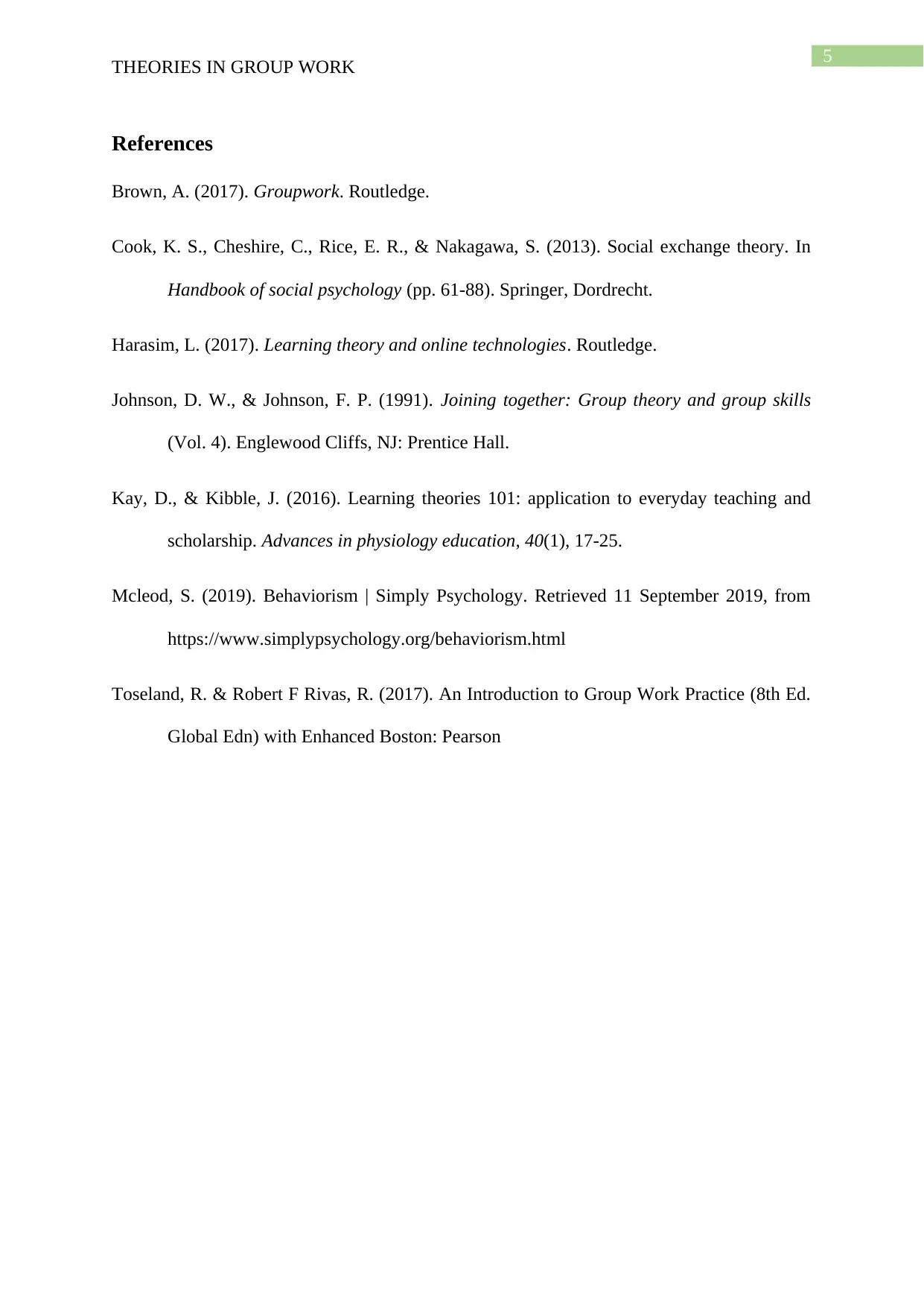Bachelor of Community Services: Essay on Group Work Theories (CAS102)
VerifiedAdded on 2022/11/18
|6
|1505
|296
Essay
AI Summary
This essay, written for a Bachelor of Community Services course (CAS102), provides a comparative analysis of two prominent theories in group work: Learning Theory and Social Exchange Theory. The introduction highlights the importance of group work in modern society, contrasting it with the rise of individualism. The discussion delves into Learning Theory, covering its sub-divisions of Behaviorism, Cognitivism, and Constructivism, and explores how these elements influence an individual's ability to learn, process, and retain knowledge. The essay then examines Social Exchange Theory, focusing on the dynamics of interactions and the cost-benefit analysis involved in social behavior, including the role of economic factors and social responsibilities. The similarities and differences between the two theories are examined, with an emphasis on motivation and rewards. The conclusion underscores the significance of group work and social work in fostering positive change and supporting vulnerable individuals within the evolving social landscape. The essay uses scholarly articles and course texts to support its arguments.

Running Head: THEORIES IN GROUP WORK
THEORIES IN GROUP WORK
Name of the Student
Name of the University
Author Note
THEORIES IN GROUP WORK
Name of the Student
Name of the University
Author Note
Paraphrase This Document
Need a fresh take? Get an instant paraphrase of this document with our AI Paraphraser

1
THEORIES IN GROUP WORK
Introduction
This paper aims to discuss about the theories in the educational system that looks
forward to the development of the individuals through various practices in the group. When
one refers to a group work, it refers to two or more individuals working together towards a
unified goal. In the modern times, the advent of nucleated family structures as well as
focusing on a solo lifestyle has buried down the skills and practices of working in a group or
community or a social atmosphere. Social work has long been a part of the group work in the
realms of health and medications (Brown, 2017). However, with the advent of globalization
and marginalization of social works, the situation has diminished the sense of working
together in a group. Individualization has been a major cause of this with the growth of
difficulties that people face in Anger Management, Parenting Skills and Managing Difficult
Behavior Groups (Brown, 2017). These can be easily countered with the ethics and theories
practiced in group works. The two theories chosen for discussion in the sections below are
Learning Theory and Social Exchange Theory.
Discussion
The theories in the social structure enables the groups to practice and imbibe within
them the basic values of socializing and respecting other humans, animals and nature while
working in a cohesive and collaborative environment. Learning Theory portrays the methods
in which the students can understand, absorb, process and retail that knowledge during the
process of learning something (Harasim, 2017). The layers on which these theories work are
cognition, environmental and emotion. The Social Exchange Theory is type of psychological
or sociological theory that reads the social behavior of the people and their interaction. This
implements a cost-benefit analysis to predict the benefits and risks (Johnson & Johnson,
1991). It also involves the building up of relationships of economic importance between the
THEORIES IN GROUP WORK
Introduction
This paper aims to discuss about the theories in the educational system that looks
forward to the development of the individuals through various practices in the group. When
one refers to a group work, it refers to two or more individuals working together towards a
unified goal. In the modern times, the advent of nucleated family structures as well as
focusing on a solo lifestyle has buried down the skills and practices of working in a group or
community or a social atmosphere. Social work has long been a part of the group work in the
realms of health and medications (Brown, 2017). However, with the advent of globalization
and marginalization of social works, the situation has diminished the sense of working
together in a group. Individualization has been a major cause of this with the growth of
difficulties that people face in Anger Management, Parenting Skills and Managing Difficult
Behavior Groups (Brown, 2017). These can be easily countered with the ethics and theories
practiced in group works. The two theories chosen for discussion in the sections below are
Learning Theory and Social Exchange Theory.
Discussion
The theories in the social structure enables the groups to practice and imbibe within
them the basic values of socializing and respecting other humans, animals and nature while
working in a cohesive and collaborative environment. Learning Theory portrays the methods
in which the students can understand, absorb, process and retail that knowledge during the
process of learning something (Harasim, 2017). The layers on which these theories work are
cognition, environmental and emotion. The Social Exchange Theory is type of psychological
or sociological theory that reads the social behavior of the people and their interaction. This
implements a cost-benefit analysis to predict the benefits and risks (Johnson & Johnson,
1991). It also involves the building up of relationships of economic importance between the

2
THEORIES IN GROUP WORK
involved parties. This occurs in situations where one or more parties retain goods the other
party or parties might be interested in.
Learning Theory: The learning theory rests around the three major sub divisions of
Behaviorism, Cognitivism and Constructivism besides Motivation. In these situations, the
aspect of behaviorist theory focusses on the individuals, their behavior, conditioned by the
factors of the environment and the simple habitual aspects (Kay & Kibble, 2016). It is used to
train a person into developing a certain kind of practice of habit. Social cognition develops
from the ability of an individual to understand and process his or her knowledge based on the
theories learned and knowledge that one retains to apply in a specific situation. The
developmental perspective of idea of constructivism is another situation where one individual
learns and develops skills over a long period of time. None of it is innate but acquired with
time and practice (Mcleod, 2019). In the motivation theory, an understanding is developed
between the members of the groups through interactions and this is on the basis of corporal
punishments and rewards where one is encouraged if he or she depicts a good work and
punished is the person harms the positivity of the social optimal situation. When faced with
problems, abilities to manage them is developed through these.
Social Exchange Theory: This theory is purely driven by interactions between
communities of groups to attain a sustainable and optimal position in the society as well as
the economy. In this situation, the social exchange theory can be worked on the major
perspectives as depicted by the previous writings of Blau (1964), Homas (1961) and Emerson
(1962, 1972). This is a theory is based on an orientation revolving around both philosophical
and psychological perspectives of utilitarianism. Social exchange theory is not only an
exchange of the economic factors but also social activities and responsibilities among the
various sections of the society. Homas formulated five propositions to understand the
dynamics of social exchange theory (Cook et al., 2013). The first proposition was concerned
THEORIES IN GROUP WORK
involved parties. This occurs in situations where one or more parties retain goods the other
party or parties might be interested in.
Learning Theory: The learning theory rests around the three major sub divisions of
Behaviorism, Cognitivism and Constructivism besides Motivation. In these situations, the
aspect of behaviorist theory focusses on the individuals, their behavior, conditioned by the
factors of the environment and the simple habitual aspects (Kay & Kibble, 2016). It is used to
train a person into developing a certain kind of practice of habit. Social cognition develops
from the ability of an individual to understand and process his or her knowledge based on the
theories learned and knowledge that one retains to apply in a specific situation. The
developmental perspective of idea of constructivism is another situation where one individual
learns and develops skills over a long period of time. None of it is innate but acquired with
time and practice (Mcleod, 2019). In the motivation theory, an understanding is developed
between the members of the groups through interactions and this is on the basis of corporal
punishments and rewards where one is encouraged if he or she depicts a good work and
punished is the person harms the positivity of the social optimal situation. When faced with
problems, abilities to manage them is developed through these.
Social Exchange Theory: This theory is purely driven by interactions between
communities of groups to attain a sustainable and optimal position in the society as well as
the economy. In this situation, the social exchange theory can be worked on the major
perspectives as depicted by the previous writings of Blau (1964), Homas (1961) and Emerson
(1962, 1972). This is a theory is based on an orientation revolving around both philosophical
and psychological perspectives of utilitarianism. Social exchange theory is not only an
exchange of the economic factors but also social activities and responsibilities among the
various sections of the society. Homas formulated five propositions to understand the
dynamics of social exchange theory (Cook et al., 2013). The first proposition was concerned
⊘ This is a preview!⊘
Do you want full access?
Subscribe today to unlock all pages.

Trusted by 1+ million students worldwide

3
THEORIES IN GROUP WORK
with the development of a positive behavior, the second was based on the proposition of
stimulus where behaviors are being rewarded. The third is the value proposition that looks at
the yield received by the society as an effect of the actions by a group or an individual in a
society. The fourth proposition is majorly the deprivation-satiation where the idea of
diminishing marginal utility comes into play. The idea of this theory of diminishing marginal
utility states that with the increase in the quantity of an economic good or commodity, that is,
with the increase in the supply of a commodity in the economy, the value derived from each
unit of that product or the marginal utility declines with the increase in the availability of the
same. The fifth proposition speaks of the reactions of the individuals to the different
situations. This includes the situation when an individual gets angry when his or her demand
or anticipation is not met with what the individual has been expecting. This happens when the
individuals or the group fails to receive a fair rate of return for the effort or hard work that
they put into a task. This introduces the concept of distributive justice into the analysis of
dyadic exchange (Cook et al., 2013).
The above discussion portrays the situation of the social theories practiced in group
works. In the Learning Theory, it focusses more on the ability of a group or an individual in a
group to grasp a knowledge and utilize that in real situations. While the Social Exchange
Theory relates more to the aspect of learning by doing or experiences gained from
interactions with other individuals in a team. The similarities observed in both these theories
is that they function on the aspect of motivation and rewards. However, in the Social
Exchange Theory, this aspect fails to work as the rewards or punishments do not stop there
but leads to a disruption in the economy. It attempts to reach an optimal position with fair or
just distribution of goods and resources. It aims to provide a reflection of the much real
scenario of the society where disturbances are primarily caused due to economic instability or
inequality.
THEORIES IN GROUP WORK
with the development of a positive behavior, the second was based on the proposition of
stimulus where behaviors are being rewarded. The third is the value proposition that looks at
the yield received by the society as an effect of the actions by a group or an individual in a
society. The fourth proposition is majorly the deprivation-satiation where the idea of
diminishing marginal utility comes into play. The idea of this theory of diminishing marginal
utility states that with the increase in the quantity of an economic good or commodity, that is,
with the increase in the supply of a commodity in the economy, the value derived from each
unit of that product or the marginal utility declines with the increase in the availability of the
same. The fifth proposition speaks of the reactions of the individuals to the different
situations. This includes the situation when an individual gets angry when his or her demand
or anticipation is not met with what the individual has been expecting. This happens when the
individuals or the group fails to receive a fair rate of return for the effort or hard work that
they put into a task. This introduces the concept of distributive justice into the analysis of
dyadic exchange (Cook et al., 2013).
The above discussion portrays the situation of the social theories practiced in group
works. In the Learning Theory, it focusses more on the ability of a group or an individual in a
group to grasp a knowledge and utilize that in real situations. While the Social Exchange
Theory relates more to the aspect of learning by doing or experiences gained from
interactions with other individuals in a team. The similarities observed in both these theories
is that they function on the aspect of motivation and rewards. However, in the Social
Exchange Theory, this aspect fails to work as the rewards or punishments do not stop there
but leads to a disruption in the economy. It attempts to reach an optimal position with fair or
just distribution of goods and resources. It aims to provide a reflection of the much real
scenario of the society where disturbances are primarily caused due to economic instability or
inequality.
Paraphrase This Document
Need a fresh take? Get an instant paraphrase of this document with our AI Paraphraser

4
THEORIES IN GROUP WORK
Conclusion
Social workers seem to work in an impossibly big world with varied ideas, which are
both contrasting and competitive besides being able to place some kind of knowledge or
pattern on the various bases of knowledge that are put forth by the enthusiasts. Social
theorists have been in a considerable good position to understand the argument that revolves
around the premise of social reality, including what one knows about the reality and about the
people in the society (Brown, 2017). The rich and powerful make and define laws according
to their needs. This makes the distribution of the resources and the opportunities
inappropriate, jeopardizing a few under the same scenario who are already in a vulnerable
social stature (Brown, 2017). Group works and social works can predominantly help to boost
and uplift these people as it enables them to bring a change in the social paradigm of the
modern, globalized world.
THEORIES IN GROUP WORK
Conclusion
Social workers seem to work in an impossibly big world with varied ideas, which are
both contrasting and competitive besides being able to place some kind of knowledge or
pattern on the various bases of knowledge that are put forth by the enthusiasts. Social
theorists have been in a considerable good position to understand the argument that revolves
around the premise of social reality, including what one knows about the reality and about the
people in the society (Brown, 2017). The rich and powerful make and define laws according
to their needs. This makes the distribution of the resources and the opportunities
inappropriate, jeopardizing a few under the same scenario who are already in a vulnerable
social stature (Brown, 2017). Group works and social works can predominantly help to boost
and uplift these people as it enables them to bring a change in the social paradigm of the
modern, globalized world.

5
THEORIES IN GROUP WORK
References
Brown, A. (2017). Groupwork. Routledge.
Cook, K. S., Cheshire, C., Rice, E. R., & Nakagawa, S. (2013). Social exchange theory. In
Handbook of social psychology (pp. 61-88). Springer, Dordrecht.
Harasim, L. (2017). Learning theory and online technologies. Routledge.
Johnson, D. W., & Johnson, F. P. (1991). Joining together: Group theory and group skills
(Vol. 4). Englewood Cliffs, NJ: Prentice Hall.
Kay, D., & Kibble, J. (2016). Learning theories 101: application to everyday teaching and
scholarship. Advances in physiology education, 40(1), 17-25.
Mcleod, S. (2019). Behaviorism | Simply Psychology. Retrieved 11 September 2019, from
https://www.simplypsychology.org/behaviorism.html
Toseland, R. & Robert F Rivas, R. (2017). An Introduction to Group Work Practice (8th Ed.
Global Edn) with Enhanced Boston: Pearson
THEORIES IN GROUP WORK
References
Brown, A. (2017). Groupwork. Routledge.
Cook, K. S., Cheshire, C., Rice, E. R., & Nakagawa, S. (2013). Social exchange theory. In
Handbook of social psychology (pp. 61-88). Springer, Dordrecht.
Harasim, L. (2017). Learning theory and online technologies. Routledge.
Johnson, D. W., & Johnson, F. P. (1991). Joining together: Group theory and group skills
(Vol. 4). Englewood Cliffs, NJ: Prentice Hall.
Kay, D., & Kibble, J. (2016). Learning theories 101: application to everyday teaching and
scholarship. Advances in physiology education, 40(1), 17-25.
Mcleod, S. (2019). Behaviorism | Simply Psychology. Retrieved 11 September 2019, from
https://www.simplypsychology.org/behaviorism.html
Toseland, R. & Robert F Rivas, R. (2017). An Introduction to Group Work Practice (8th Ed.
Global Edn) with Enhanced Boston: Pearson
⊘ This is a preview!⊘
Do you want full access?
Subscribe today to unlock all pages.

Trusted by 1+ million students worldwide
1 out of 6
Related Documents
Your All-in-One AI-Powered Toolkit for Academic Success.
+13062052269
info@desklib.com
Available 24*7 on WhatsApp / Email
![[object Object]](/_next/static/media/star-bottom.7253800d.svg)
Unlock your academic potential
Copyright © 2020–2026 A2Z Services. All Rights Reserved. Developed and managed by ZUCOL.





